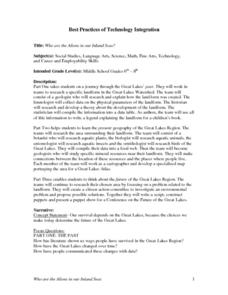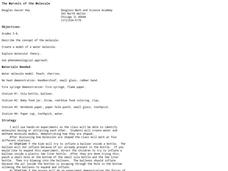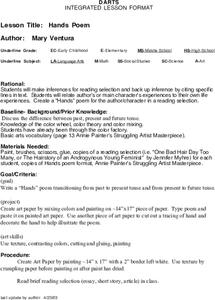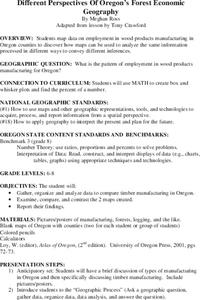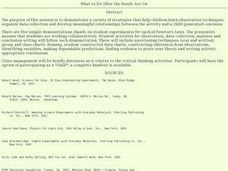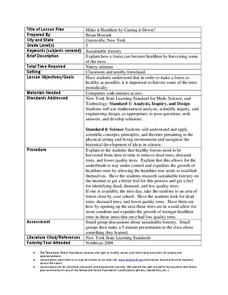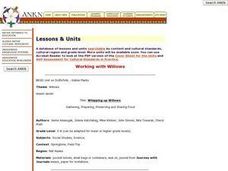Curated OER
Industrial Revolution in America: Exploring the Effects of the Heat Engine on the Growth of Cities
Students research the development of the steam engines. In this US history lesson, students analyze the impact of this invention to civilization. They discuss the events leading to the growth and development of different cities.
Curated OER
Who Are the Aliens in Our Inland Seas?
Students work in teams to research specific landforms in Great Lakes Watershed, compile information into data table, and write legend explaining landform for children's book. Students then research area surrounding landform, compile...
Curated OER
The Marvels of the Molecule
Students experiment with common substances to observe molecular behavior. In this molecular properties instructional activity, students move through four stations as they try to inflate a balloon inside a bottle, pour water from a jar,...
Curated OER
Hands Poem
Students create a "Hands" poem for the author/character in a reading selection.They make inferences for reading selection and back up inference by citing specific lines in text. They relate author's or main character's experiences to...
Curated OER
Different Perspectives of Oregon's Forest Economic Geography
Young scholars locate the many forests located in Oregon. In groups, they use the internet to research employment data on wood products made in the state. They discuss how looking at information presented in a different way can change...
Curated OER
Burn, Baby Burn (Or Not)
Physics learners apply the concepts of fluid pressure input and output to firefighting. Divide your class into small groups and give them each a few cards that list nozzle type, hose length, hose size, and structure dimensions, They are...
Curated OER
Chef for a Day
Students make chocolate chip cookies. In this cooking lesson plan, students follow a recipe by doing each step in sequence.
Curated OER
What To Do After The Hands-Are-On
Students perform various demonstrations for each of Newton's Laws, collect data, and write a conclusion for each.
Curated OER
Make it Healthier by Cutting it Down?
Fifth graders discuss sustainable forestry. In this forestry lesson, 5th graders discuss how healthy forests need to have dead, diseased and lower quality trees cut down and harvested. They visit a local forest and identify these 3 types...
Curated OER
From Molecules to Mole Day Do's
Students recognize methods used to define the mole. After converting various quantities to the mole, students provide a context for understanding the usefulness of scientific notation and the mole.
Curated OER
Whipping up Willows
Students use the information they were able to discover from elders and community members as a basis for their study of ows. This lesson leads to a time of sharing with the elders and community members who provided information to Students.
Alabama Learning Exchange
Action at Plate Boundaries
Students diagram the spreading of the ocean floor. In this earth science lesson plan, students read an article on plate boundaries of the ocean. Students are expected to diagram the oceanic convergent boundary, and...
Alabama Learning Exchange
Alex: My Favorite Number
The activity allows students to review many of the number theory concepts. Students will pick a composite number write verbal expressions about the number, find the factors, prime factorization, list multiples, draw a cartoon character...
Better Lesson
Better Lesson: More Meat!
Third graders practice skills of addition, subtraction, word problems and graphing and develop their own theories about why meat consumption is so different across the world.



